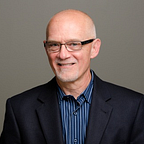“Yes. Conscience against Conscription.”
One hundred years ago today my great-uncle and namesake, Paul Jacob Kuehnert, went to his polling place in the little Mississippi River town of Wittenberg, Missouri and registered for the draft. In and of itself, that act was unremarkable. Roughly 10 million American men between the ages of 21 and 35 registered that day in compliance with the Selective Service Act passed by the U.S. Congress the month before after it declared war on Germany in April, 1917.
But, as far as I know, he was the only man among the 1,100 that registered in his rural county 100 miles south of St. Louis that publicly protested the draft that day.
Uncle Paul protested by writing in a unique claim of exemption on line 12 of the registration form. There in his neat handwriting that befit his job as a clerk in a general store he wrote in answer to the question, “Do you claim exemption from the draft (please specify)”, four powerful words: “Yes. Conscience against Conscription”.
Uncle Paul was not a radical. He was not a member of a traditional ‘peace’ church, such as the Mennonites, Brethren or Quakers. He was not a militant trade unionist nor an active member of the large peace movement that spanned the country in the years before the U.S. entered the war. He was twenty-three years old and still lived on his parents’ farm a couple of miles from Wittenberg, back in the hills of rural Perry County, Missouri. He was the second-youngest of five boys who were the second generation descendants of one of the hundred and thirty or so families that had emigrated from Saxony for religious reasons in 1839. His father, grandfather and great-grandfather had all been elders in Trinity Lutheran Church in Altenburg, Missouri, one of the founding congregations of the Lutheran Church-Missouri Synod. His oldest brothers, Arthur and Theodore, were a pastor and a school superintendent in the Synod.
Until that point in his life, Uncle Paul was clearly living in the mainstream of his rural Missouri community. And his protest gave voice to the majority viewpoint on the war and the draft in that part of Missouri — -in fact, most of the Midwest and West — -at the beginning of U.S. involvement in WWI. Books on WWI and Missouri by Christopher Gibbs and Petra DeWitt have documented that as many as two-thirds of draft-eligible men in Missouri claimed exemptions from military service during WWI and that there was widespread non-participation in and some active resistance to campaigns ranging from food production to the purchase of war bonds. Uncle Paul’s conscientious objection to conscription itself was consistent with both Lutheran theology and the history of democratic movements in Germany in the 18th and 19th centuries. (More on these points in future posts!)
Uncle Paul’s exemption was not granted. His lottery number, drawn in August, was eleven. He was drafted in September, decided to serve. He did so, with the Company G of the 354th Infantry of the U.S. Army, part of what became the U.S. Expeditionary Force led by General Pershing. He was wounded in the battle of St. Mihel in the spring of 1918, recovered and remained in France until discharged after the armistice in early 1919. He then returned to Perry County, got married and raised his two sons in Cape Girardeau, MO.
On another June day some fifty-three years after Uncle Paul’s protest action I took a similar stand on the draft and the war in Vietnam by not registering for the draft when I turned eighteen. I, too, made my decision public, sharing my decision with members of my community. Unfortunately, I could not benefit from Uncle Paul’s experience and advice. He died a decade before I was born. I have not been able to find any letters or other written records that describe how and why he took the highly risky, public stand against the draft and war as a young man in 1917.
We live in times in which many are, once again, calling for increasing national security and war readiness. I would not be surprised if we hear more and more about the need to revive the draft as part of the push for preparedness. Those of us that believe that security is best built on a foundation of justice, reconciliation and peace have our work cut out for us. A part of that work is making our stories of building the movement against the draft in past wars — -especially Vietnam — -much more widely known.
